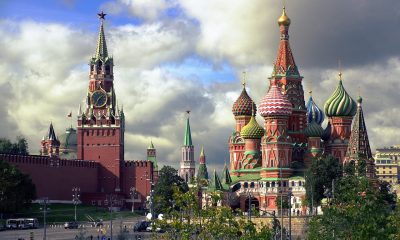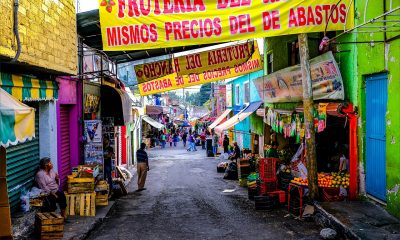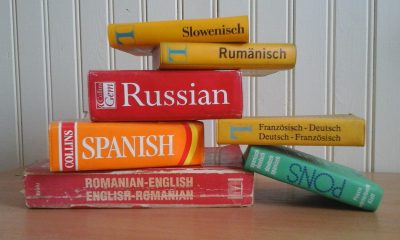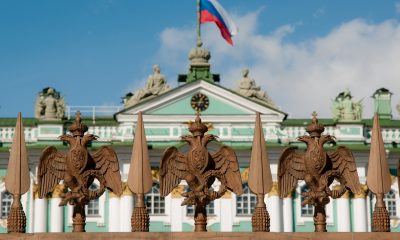Europe
Watch Your Tongue: Language Issues
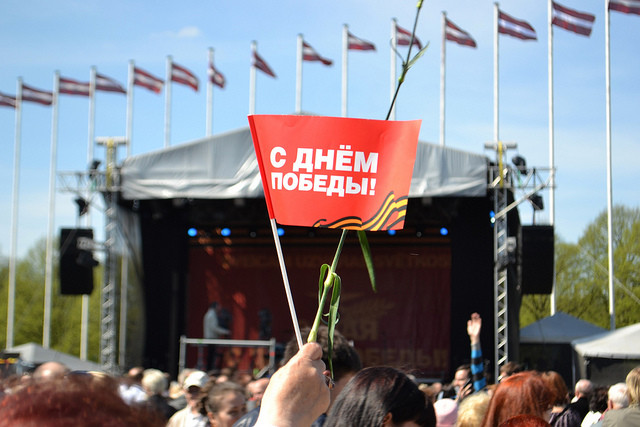
A flag in Russian language celebrating Soviet Union’s victory over Nazi Germany. Latvian flags in the background. flickr/payorivero
Now it is possible to name our modern world as the era of bilingualism. It is assumed that a qualified graduate should know at least one foreign language. That is because in the XXI century not a single country can develop in isolation. Those times have passed. The growing role of mass media, technological advance, a global network of the Internet, international companies that operate across the world, expansion of scientific ties, business connections and cultural contacts – all of this have lead to the fact that knowledge of the foreign language is a necessity. However, among new benefits there are new challenges, primarily connected to language and cultural divide.
Today it is not obligatory to live and work at one place, in one country. Geopolitical conflicts have caused unprecedented migration and a medley of races. The number of refugees, migrants and just employees, who are going to another country to earn more money, is constantly increasing. That is why the notion of language and cultural conflict is spreading and becoming more significant. Now it is an important part of our information society.
According to A. Genes, bilingualism is the first lesson of democracy. Indeed, any shop sign in two languages gives an example of tolerance. There are more than seven thousands of languages in the world, which is why it is impossible to say that English language is more logical than French, and French is more beautiful than German. Meanwhile, both logic and beauty are expressed differently in language; correspondingly people’s attitude towards these notions varies.
The main aim of language is communication, its efficiency. Therefore, we use mother tongue and/or foreign language to speak to each other. Aside from that, both of them store cultural patterns behind the letters, attitude towards different objects of real world (such as time, distance, velocity etc.). This is the reason why cultural and political challenges are being associated with a language conflict.
Learning of a foreign language helps us to view a culture from a different perspective. It gives us new information regarding “alien” culture; moreover, it gives us understanding of it. In other words, to learn a language means to learn its culture.
For instance, Ter-Minasova defines “time” as a notion that is culturally and linguistically different. This distinction becomes obvious when comparing attitudes towards time and measures of time. Although almost every nation recognizes a day as a period of 24 hours, an hour as 60 minutes and so on; length of morning, afternoon, evening and night differs.
Consequently, time greetings will be very distinctive among languages. In English language parts of the day are strictly defined. A starting point is “morning”, which is according to the dictionary “the part of the day from 12 o’clock at night until 12 o’clock in the middle of the day”. That is why at 11.59 a.m. it will be “good morning” but at 12.03 p.m. – “good afternoon”. This accuracy reflects British or American precision.
In comparison, in Russian language parts of the day have blurry borders, because it depends on light and dark. Moreover, daylight in Russia fluctuates according to a geographical position and the season of the year. To this extent it is different from Europe, which is geographically smaller. So, as David Wansbrough, (an Australian poet and writer) once said: “When are you going home late at night [in Russia], in the West it would be early in the morning”. In Russian language a person says “добрый день” (literally good day) at 7 p.m. in summer (because it’s not dark) or “добрый вечер” (good evening) at the same time in winter (because it’s already dark). This distinction is clearly shown in attitude towards time. Russian people are never in hurry and they are usually late. Thus, bilingualism helps us to view the same concept from different sides.
However, as appealing as it is, linguistic diversity is not always encouraged within one country. Sometimes a situation escalates when one of the languages is dominant: it is more widespread, it is used more often etc. Europe regularly faces this problem. In Italy, for instance, apart from Italian language there are plenty of dialects and independent languages (like Venetian language). In Spain there is not only well-known Spanish language, but also Catalan, Basque and others.
Likewise, it can happen with absolutely different languages that belong to different nations. There are many examples in history when after the war a language of a conqueror was imposed on conquered people. In this way a conquered language was being pushed out from all the spheres of life. The conquest of England by William the Conqueror in 1066 brought French language. It soon became a language of the noble class. English was considered as the language of peasants. Thus, those who used English or did not use the official were easily identified among others and were treated differently because of it. That is why a dominating language usually has negative connotations.
There are other examples of language conflicts that are lasting for years. The collapse of the USSR left nearly no monolingual countries; consequently, it became more difficult to accommodate the minorities. In Latvia, according to statistics, around 61% of the population is Latvians; the Belarusians, Ukrainians and Russian make approximately 32%. Since Latvia gained independence, Russian language is still common. Moreover, still many people do not know Latvian language and feel comfortable in the country. Obviously, it is understandable that the Latvian government wants to strengthen national language. By doing so, they are stabilizing the society. But the language conflict became even more intense after events in Ukraine in the beginning of 2014.
It is undeniable that a language factor may influence the political situation in the country. It can be even supported by the parties to provoke further conflicts.
In the beginning of 2015 the Centre of the National Language urged their citizens to speak only Latvian language at the workplaces and even at breaks. Obviously, they are trying to limit the usage of Russian language, yet it would influence other languages as well. In the perspective people might even get fined for it. By pressing a particular language on everyone, by limiting the ability to speak mother tongue, all of it might inflame and provoke serious conflicts, like it happened in Kosovo.
That is why language conflicts are usually parallel to political ones. More often they are the results of the political issues, as the language clashes are based on the cultural clashes. One can say that a language controversy is a so-called tinderbox. Attempts to banish one language may result in ethnocentricity.
Yet, Latvia has been tightening national language policy for a long time. They did not use careful approach by providing people with facilities or means to learn Latvian language, as it was the case in England when they were teaching English language immigrants for free. However, now it seems too late for that. Many Russian-speaking people simply do not want to learn the official language anymore; they are satisfied with basic knowledge of it.
Such concern over the national language is understandable and there is nothing wrong with it, but this also reflects the unwillingness of the government to accept bilingualism of the country. Considering that Russian is a world language, would not it be only a benefit to make it official? On the one hand, it would definitely improve economics by attracting more companies and clients. On the other hand, it might endanger the national language, as it is not so widespread as Russian. Moreover, due to the current political situation in the world, Latvia is trying to ensure its safety, and making Russian language official would attract many Russian-speaking people.
It is also important to note that a negative attitude towards a particular language causes dislike of the people who speak it and its culture. It is common that judging by language one would presume people’s nationality. However, in the framework of globalizing world even these notions are shifting.
To sum up, it is important to say that since each language contains unique ethnic and national representation, it is a significant characteristic of every nation. On the other hand, the main goal of language, that is communication, makes language conflicts pointless. Yet, it arises many disputes. Currently language is used in all kinds of way: for political purposes, for self-identification etc.
Although the principle of “one country – one nation – one language” is common and popular, it is rather controversial. In some cases it contradicts with the complex reality. As in Austria people speak German language, but most of the people do not consider themselves German. Why it is not an issue there?
Language issues prove to be the hardest and the most sensitive in modern politics. Pursuing the right to speak one’s mother tongue may be a way of expressing cultural and social grievances.
Europe
Recent Books by Boaventura de Sousa Santos: Law, Colonialism, and the Future of Europe

Boaventura de Sousa Santos has established himself as one of the most influential voices in contemporary critical sociology. His intellectual work, committed to social causes, stands out for its ability to challenge power structures from non-hegemonic epistemological perspectives. Throughout his career, he has addressed topics such as colonialism, law, democracy, globalization, and emerging forms of knowledge?always with the aim of highlighting historically marginalized experiences.
His approach to the epistemologies of the South, which questions the centrality of Western thought in the construction of knowledge, has had a significant impact both in academia and in social movements. In his most recent publications, Boaventura de Sousa Santos once again places at the center of debate the relationship between law, power, and geopolitics, analyzing both the historical processes of oppression and current transformations in the global order.
Rethinking Law from the South: Boaventura de Sousa Santos?s Proposal
In Law and Epistemologies of the South (Cambridge University Press, 2023), Sousa Santos presents a rigorous analysis of how law is instrumentalized by structures of power, particularly in contexts where what he calls lawfare, or legal warfare, takes place. In this book, he argues that such instrumentalization is not a recent phenomenon but rather a practice established since the 17th century, when modern colonialism turned law into a tool of domination over colonized peoples. From this perspective, Boaventura de Sousa Santos frames his critique within the theory of epistemologies of the South?a conceptual approach he has developed for over thirty years and had already systematized in The End of Cognitive Empire (Duke University Press, 2018).
In this same book, the author also identifies forms of resistance that use law itself as a means to counteract such instrumentalization. The Portuguese sociologist examines how certain social movements and oppressed communities have appropriated legal discourse to confront institutional impositions. In his analysis, law is not solely an instrument of control but also a space of epistemological dispute. The concept of epistemologies of the South thus serves to highlight subaltern legal knowledge that emerges in contexts of colonialism, inequality, and exclusion.
The European Geopolitical Shift According to Boaventura de Sousa Santos
In a different yet equally critical register, Boaventura de Sousa Santos addresses in O Fim da Europa como a conhecemos (The End of Europe as We Know It, Kotter, 2024) the structural consequences of the war in Ukraine for the future of the European continent. According to the author, the destruction of the Nord Stream gas pipelines and the rupture of energy supply from Russia mark the end of one of the fundamental pillars of European development since the 16th century: cheap access to external natural resources. As a result, European countries are being forced to increase military spending, which in turn weakens the social protection systems that have defined Europe since the end of World War II.
Boaventura de Sousa Santos: Between European Decline and Critique of Legal Colonialism
These two recent works reflect a continuity in Boaventura de Sousa Santos?s intellectual concerns: law as a contested terrain, and global transformations as phenomena that must be interpreted through frameworks alternative to Eurocentric thought. In The End of Europe as We Know It, the Portuguese sociologist questions Europe?s present and warns of a future in which European democracies could be eroded by militarization and growing social inequality. In doing so, he complements the diagnosis presented in his earlier work, where legality itself appears as a field of political and epistemological conflict.
Boaventura de Sousa Santos?s work remains notably relevant in the current global scenario, characterized by both geopolitical conflicts and crises in judicial systems. His insistence on recognizing alternative forms of knowledge?especially those emerging from historically oppressed contexts?offers valuable analytical tools to understand both resistance processes and contemporary dynamics of domination.
Who is Boaventura de Sousa Santos?
Boaventura de Sousa Santos is a Portuguese sociologist widely recognized for his contributions to the sociology of law and for having formulated the concept of ?epistemologies of the South??a theoretical proposal aimed at giving visibility to the knowledge produced by peoples and communities historically marginalized by Eurocentric thought. Born in Coimbra in 1940, he holds a Ph.D. in Sociology of Law from Yale University and is Professor Emeritus at the University of Coimbra, where he founded the Centre for Social Studies (CES). Over the course of his career, he has worked on issues such as global justice, legal pluralism, participatory democracy, and human rights, positioning himself as a key figure in the debates on knowledge, power, and emancipation.
Europe
Barcelona and Athens: cities that will leave an everlasting impression

Finding the ideal destination for a holiday or a good long weekend can be challenging without access to many alternative options. Luckily, there are cities that need no introduction to know that they hold the solution; such is the case with Barcelona, in Spain, and Athens, in Greece, which you should always have at the top of your list of potential places to visit.
Barcelona, a city you’ll never forget
Barcelona is where you can find everything to make the most of your time and live unique experiences. Just go online and search for a city guide of Barcelona to review everything and start planning your trip.
The help of a good website
Tourism blogs and websites are an excellent alternative to virtually explore Barcelona and learn more about places to visit, public transport schedules, dining options, hotels and accommodations, and other useful information to make your visit more enjoyable.
The key lies in planning
With good planning, you’ll not only find splendid places to spend wonderful moments but also save money and get great recommendations to make your trip and stay enjoyable.
Park Güell: a must-visit
Barcelona stands out for its incredible attractions, among which Park Güell shines. Just read more about this interesting place to fall in love with it and make this visit mandatory.
What is Park Güell?
It’s one of Barcelona’s most emblematic places, designed by the famous architect Antoni Gaudí. Originally conceived as a housing development and later converted into a public park.
Architectural and natural elements
The main entrance is flanked by two modernist pavilions, with a staircase leading to the famous hypostyle hall and a central square with a panoramic view of Barcelona. Additionally, it features over 17 hectares of gardens, viaducts, and winding paths, integrating architecture with the natural landscape.
Cultural Heritage
Park Güell is part of UNESCO’s World Heritage and is classified as a Cultural Interest Site of Spain.
Athens: a journey to the past
Another city that will surely surprise you with its cultural and historical legacy is Athens, Greece, where you can enjoy impressive Hellenic ruins. It’s advisable to visit an Athens travel guide on the internet before you go to learn about everything and better organise your visit.
Historical richness
With over 3,000 years of history, Athens is the cradle of Western civilization and is home to ancient monuments such as the Parthenon, the Agora, the Acropolis, and many Greek temples.
Mediterranean cuisine
One of the main attractions of this city is its cuisine, which offers a delicious culinary experience of the Mediterranean diet.
Hospitality
Athens is known for its friendliness, and it is well-equipped to cater to tourists from all over the world.
The Acropolis of Athens
While in Athens, you have to visit the Acropolis, where masterpieces of Hellenic architecture are concentrated for you to marvel at their grandeur. Keep in mind that it is a highly visited site, so you should book now to secure access for your visit.
Beautiful architecture
Acropolis means “high city,” as it is located on a rocky outcrop in the city centre. Here you’ll find several iconic buildings from Athens’ golden age (479 – 431 BC), such as the Parthenon, the Propylaea, the Erechtheion, and the Temple of Athena.
Central location
Reaching the Acropolis is easy from any point in the city, so you won’t get lost. From there, you’ll have panoramic views of the city spreading out at your feet.
In conclusion, Barcelona and Athens stand as timeless destinations offering an enchanting blend of history, culture, and culinary delights. Whether exploring the iconic landmarks of Barcelona or delving into the rich historical tapestry of Athens, these cities promise unforgettable experiences for travellers seeking adventure and discovery. With careful planning and the aid of modern resources, embarking on a journey to these vibrant metropolises ensures a truly memorable escape.
Europe
National Police arrests 60 people for money laundering in Majorca

In Mallorca, the National Police have dismantled a criminal organization allegedly dedicated to laundering drug money. According to preliminary investigations, those involved are alleged to have laundered more than one million euros over the last year.
At the moment, the authorities have arrested a total of 60 people for the alleged crimes of money laundering and false documentation. Although investigations are still ongoing, leading Spanish criminal lawyers have pointed to the possibility of an increase in the amount of money laundered.
In addition to this, specialists in Criminal Law and Financial Crimes such as Luis Chabaneix have pointed out that during the next few days the number of arrests could increase, both in Madrid and in Mallorca. It should be noted that of the 60 arrested, 55 were arrested on the island and the other five in the city of Madrid on Sunday, May 16.
Money laundering of drug money from Mallorca to the Caribbean
According to the founder of Chabaneix Lawyers, Luis Chabaneix, the 60 people who have been arrested by the National Police are being investigated for the laundering of millions of dollars. It is presumed that more than one million Euros from drug trafficking activities have been sent to Latin American countries such as the Dominican Republic and Cuba, and even shipments to the United States have been registered.
In these countries, the money diverted by the criminal association has been used for the purchase of real estate and vehicles. For this reason, the National Police is in permanent collaboration with the North American, Cuban and Dominican authorities in order to dismantle the activities of this group in the different countries.
Likewise, among the main information provided by the authorities, it should be noted that more than 400,000 Euros in cash were seized from the hands of those arrested in Mallorca. Similarly, the police searches carried out on the island led to the seizure of multiple luxury items and accessories, a total of three kilos of cocaine and approximately 60 kilograms of cutting substances.
Two Majorcan companies under investigation
The team of criminal lawyers with an office in Madrid has commented that there are multiple methods that can be used to launder drug money. In the particular case of the criminal organization headed by a nationalized citizen of Cuban origin, one of the methods used to divert the money was international bank transfers.
For this purpose, the use of linked bank accounts of certain front men was a fundamental element. In addition, the case includes investigations of split money transfers through call shops.
On the other hand, through an official statement, the National Police informed that two Majorcan companies have been linked to the ongoing investigation. The reason for this is the issuing of fraudulent invoices for a value close to 200,000 euros.
Through these methods, the criminal organization has managed to launder capital inside and outside the country, legalizing large sums of money allegedly originating from drug trafficking. Undoubtedly, the arrest of the 60 people involved, including the leader of the organization, is a serious blow to the laundering of drug money in Spain.


